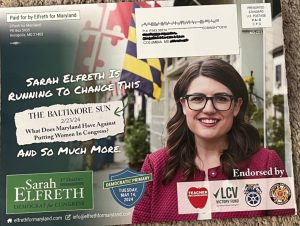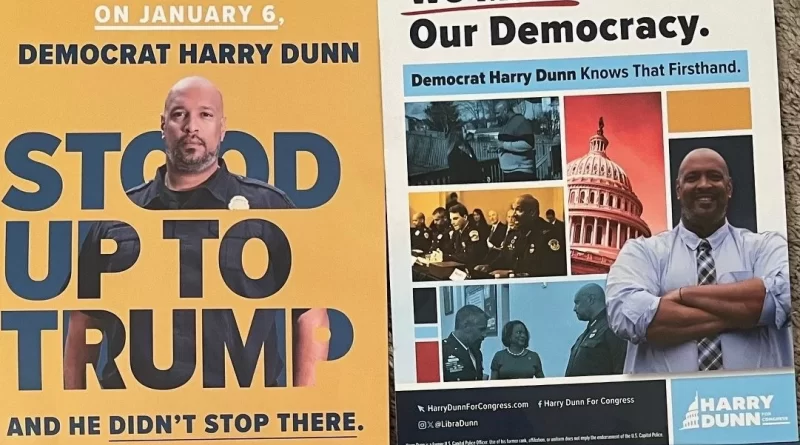Political predictions are foolhardy but demanded; Harry Dunn spends in 3rd CD; not heartbroken, angry
Making predictions about what politicians will do is pretty foolhardy, even when the prediction seems fairly safe. But readers and circumstances often demand them.
On March 18, I finished my column for The Business Monthly. Among other things it said: “About the only prediction it is fairly safe to make is that the lawmakers will close up their 90-day session at midnight on April 8, having passed a balanced budget.”
On April 2, that prediction looked in trouble. House and Senate budget negotiators were barely speaking. Gov. Wes Moore ordered an extension of the session if needed, a fairly routine order in many sessions that might be needed this year. Then overnight the senators and delegates came up with a deal. It looked like the kind of compromise I suggested could happen. I was relieved. I once again avoided looking foolish or clueless.
The surprise in the compromise was yet another increase in cigarette taxes that I hadn’t seen mentioned before. Maryland has had several increases in tobacco taxes, making the cost of cigarettes at $3.75 a pack among the top five in the country, already dollars higher than our neighbors except for D.C. It is one of the reasons that the state, once a colony built on raising tobacco, has one of the lowest smoking rates in the country.
For more than 20 years now, I’ve been writing political columns that stick around in print for weeks after I write them, hoping they will not be overtaken by events. Whether writing daily, weekly, or monthly, I’m often asked about who will win an election. My standard response has been that it’s hard enough to find out what really happened in the past. It’s much harder to accurately predict what might happen in the future.
On the other hand, we’re always acting, reporting, and writing based on what we think will happen: schools will open, the legislature will meet, and elections will go on. When things don’t happen as expected – for instance, the Key bridge — that’s called news.
Money in the 3rd congressional district
In previous columns, I’ve proposed that the Democratic candidate with the most money in the primary to succeed Rep. John Sarbanes in the 3rd congressional district will be the most likely winner because they are all relatively unknown. In February, that looked like state senators Sarah Elfreth and Clarence Lam. At the moment it looks like former Capitol Police officer Harry Dunn might be the leading fundraiser. In a late February story, his campaign claimed he raised close to $3 million. We’ll find out on April 15 when federal fundraising reports are due.
His campaign has been spending more on advertising than the others. He was the first candidate in the race with a mailer to Democratic voters, followed up by two more – lots of the same photos and simple messages on democracy and abortion. He appears to be the first candidate to put up a TV and has since aired a second spot.
 UPDATE 4/4/2024 6 p.m.: Sarah Elfreth has sent a single mailer. A TV ad on her behalf began running this week, funded not by her own campaign, but by the United Democracy Project, which is reportedly spending $600,000 on her behalf. Dunn and two other candidates in the race protested the outside funding at the State House Thursday, as reported in a detailed story by Maryland Matters.
UPDATE 4/4/2024 6 p.m.: Sarah Elfreth has sent a single mailer. A TV ad on her behalf began running this week, funded not by her own campaign, but by the United Democracy Project, which is reportedly spending $600,000 on her behalf. Dunn and two other candidates in the race protested the outside funding at the State House Thursday, as reported in a detailed story by Maryland Matters.
Money isn’t everything in politics, but when 22 candidates with limited or no name recognition are vying, the money to get your name, photo, and key issues out to voters means a lot.
Heartbroken, sending thoughts and prayers
“We’re heartbroken about (blank), sending our thoughts and prayers.”
How many times can your heart be broken over the latest tragedy? Pick a tragedy – workers on Key Bridge, children, aid workers, journalists, pretty much everyone in Gaza, the victims of the latest mass shooting.
Did you really think about the victims? To whom did you pray?
I am not heartbroken about Gaza. I am angry. I am angry about the dead children, the dead women, the dead grandfathers, the dead aide workers. But particularly the dead journalists. The Committee to Protect Journalists, an organization based in New York to which I’ve contributed for decades and where I once interviewed for a job, says so far 95 journalists have been killed in the Gaza war – 90 Palestinians, 2 Israelis, 3 Lebanese. According to a different count, that’s more journalists than died in World War II (69), more than in Vietnam (63). I’m angry because I can do little but write something like this. Instead of just anger and outrage talk at the White House and Congress, how about stop sending bombs that kill children, aid workers, and journalists?

Len Lazarick was the founding editor and publisher of MarylandReporter.com and is currently the president of its nonprofit corporation and chairman of its board. He was formerly the State House bureau chief of the daily Baltimore Examiner from its start in April 2006 to its demise in February 2009.

